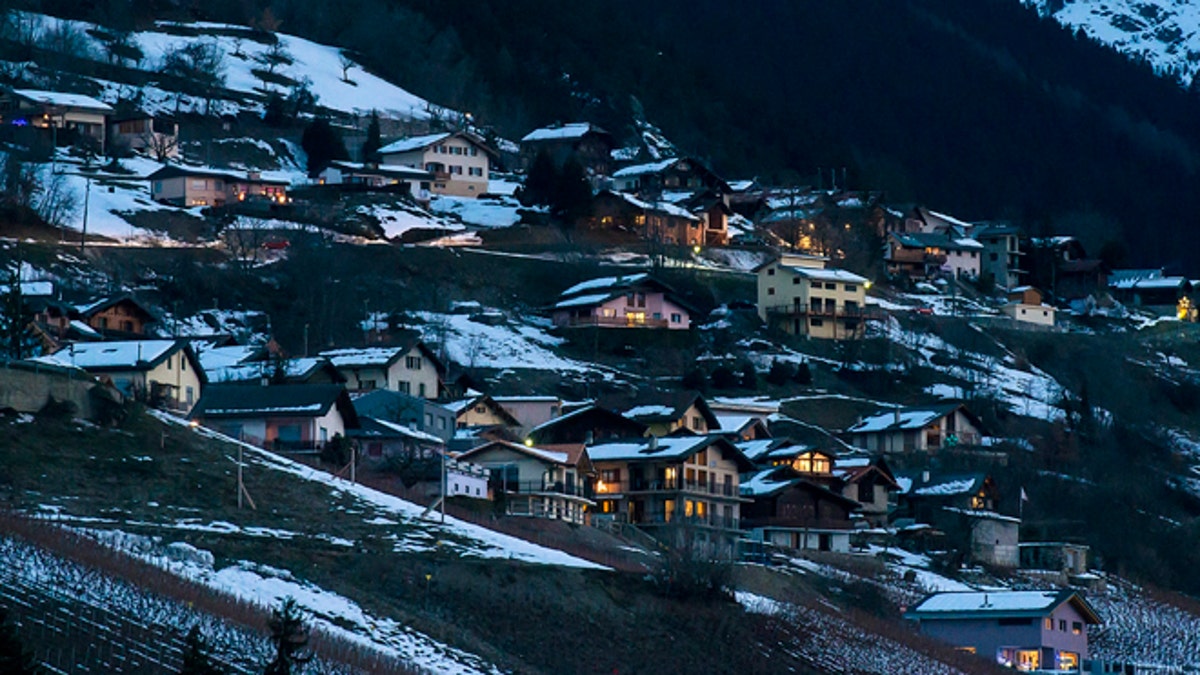
Jan. 3, 2013: A view of the village of Daillon after a shooting, in Switzerland, early Thursday. (AP)
GENEVA – A shooting in southern Switzerland left three women dead and two men wounded, police said Thursday -- a case that highlighted the ease of access to firearms in gun-loving nations.
The shooting -- which came on the eve of students' return to classes in Newtown, Connecticut, after a horrific school shooting -- also raised questions about why a troubled suspect went on a rampage with an old military rifle.
Authorities in the Swiss canton (state) of Valais say the suspect, a man in his early thirties who was living on a disability pension, fired about 20 shots Wednesday night in the village of Daillon.
Armed with a Swiss military rifle and a handgun, the man then threatened to shoot the elite troops that were sent in, police said.
"The shooter pointed his weapon at our colleagues, so they had to open fire to neutralize him, to avoid being injured themselves," police spokesman Jean-Marie Bornet told Swiss radio. He said the shooter lived in Daillon, and the motive for the shooting was not clear.
The suspect, who police did not identify, was arrested and taken to a hospital.
The suspect was using a military rifle that was once standard issue in the Swiss army during the first half of the 20th century, interim cantonal police chief Robert Steiner said.
Guns are popular among the Swiss -- the Alpine country has at least 2.3 million weapons among a population of less than 8 million. Gun clubs are popular in rural areas, with children as young as 10 taking part in shooting competitions.
Authorities say Swiss Army weapons are involved in about 300 deaths a year -- many of them suicides -- but shooting rampages are rare in peaceful, prosperous Switzerland.
Buying a firearm in a shop requires a permit, a clean criminal record and no psychiatric disability, but buying a firearm from another person is less restrictive. Most types of ammunition can be bought, while automatic firearms generally require a special police permit.
The police said they were still unclear about the shooter's motives -- or where he got the guns -- but old-style Army rifles are often sold at military surplus markets. Prosecutor Catherine Seppey said the shooter knew several of the victims but "he was not known for making threats."
The victims were three women aged 32, 54 and 79 who died at the scene, and two injured men, aged 33 and 63, who were taken to the hospital, Seppey said, adding that the two youngest victims were a couple with children.
"We have no words to express ourselves after an event like this," Christophe Germanier, head of the Conthey district where the shooting occurred, told a news conference.
The suspect was unemployed and had been receiving psychiatric care since at least 2005, when he was first admitted to a psychiatric hospital, and was under the care of the cantonal agency that provides services to the disabled, Seppey said.
Switzerland's firearms laws are relaxed, but haven't led to a high gun homicide rate. They have, however, raised concerns about a high incidence of firearm suicides.
All able-bodied Swiss men who are required to perform military duty often take their army-issued rifle home with them after completing military service. In 2007, the government began requiring that nearly all army ammunition is kept at secure army depots.
In 2011, voters rejected a proposal to tighten the gun laws.
Many in Switzerland believe that distributing guns to households helped dissuade a Nazi invasion in World War II.
